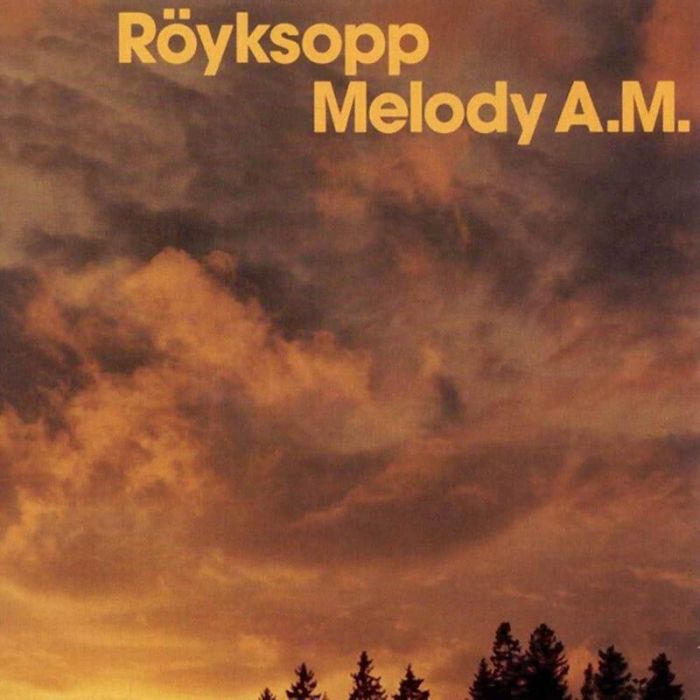Melody A.M. by Röyksopp (Review)

For the past 3 weeks, I’ve been having this fantasy every time I drive to and from work. It usually involves driving through the Swiss Alps or down a long, winding stretch of the Autobahn in a sleek, stylish European roadster with a Scandinavian beauty in the plush leather seat beside me. Obviously this is a far cry from the reality (driving down I-180 in a pea-green 1996 Mitsubishi Mirage). The reason for this delusion? I slipped Röyksopp’s Melody A.M. into the CD player several weeks ago and haven’t been able to take it out since.
In fact, it feels weird to write about this CD as I’m listening to it in my room, because I so readily associate its songs with driving. Somehow, it turns even driving my little Mirage into a suave experience that feels more like something out of Danger: Diabolik.
Röyksopp isn’t the first artist to delve into creating slick soundscapes with their music. Groups like Koop, Hooverphonic, and Mono have all done it before with varying degrees of success. However, even a casual listen reveals that the duo of Svein Berge and Torbjørn Brundtland possess an uncanny skill for crafting well-crafted slices of electro-pop.
The album opens with the one-two punch of “So Easy” and “Eple,” easily two of the album’s finest tracks. “So Easy” quickly establishes the band’s modus operandi as finely woven layers of analog synths and wordless vocals chirp and float above programming so crisp and sterile you could eat off it. “Eple” goes for a spacier sound; this time, the pulsing synths sound like transmissions from Sputnik set to a disco beat. Waves of analog synths, all buffed to a shiny chrome finish, wash over the song without ever burying its infectious melody.
At this point, it might seem like Röyksopp is all concerned with form and function, style over substance. Up to this point, their sounds have been crisp and clean, crafted and balanced to within the narrowest margins of error. But then the album takes a mellower turn with “Sparks.”
The synths and beats take on a more muted sound, and the duo blankets them with a nice, cozy vinyl crackle. The track also showcases the group’s ability for mixing vocals into their music, adding human warmth to their songs. Anneli Drecker, her voice given the same soft treatments as the music, adds a wistfulness that blends in quite nicely with the song’s warm analog sound. And for added measure, a sparse, vaguely Spanish guitar deftly winds its way between the beats and atmospheres.
“In Space” kicks things back up a notch, with a lovely cascade of plucked, harp-like sounds gracefully intertwining themselves with a constantly shifting ambience. Contrary to the title, one gets an aquatic feel from the music, like you’re watching those massive schools of silvery tropical fish dart this way and that as shafts of light filter through the ocean’s surface. “Poor Leno” provides yet another example of Röyksopp’s skill at using vocals in their music; this time its Erlend Øye’s sighing, wistful vocals tempering the flashy programming.
“Röyksopp’s Night Out” is the album’s most epic moment, as well as its most adventurous. The group jettisons part of their laid-back style, opting for a thicker, more urgent sound. The song has a propulsive feel, the insistent klaxons and orchestral stabs creating a countdown-like feel. Unfortunately, the song, which clocks in at just under 8 minutes, collapses under its own weight during an extended middle sequence that gets mired in chunky rhythms and trickling guitars.
I’ll make no secret of the fact that I often use the skip buttons while listening to this album. There are only 2 or 3 weak tracks — especially the closing “40 Years Back/Come,” which at first sounds more at home on a Plone album before breaking down into pastoral ambience — and I often find myself wanting to skip past them to get to the good stuff. Sometimes I’ll find myself listening to the same song 2 or 3 times in a row, as I quickly get addicted to the effortless grace the album exudes in its finest moments.
The precision engineering behind tracks like “So Easy” and “Eple” never seems to wear out, no matter how many times I’ve listened to them while travelling between home and office, and the album’s softer moments give it a subtle warmth that’s both unexpected and affecting.